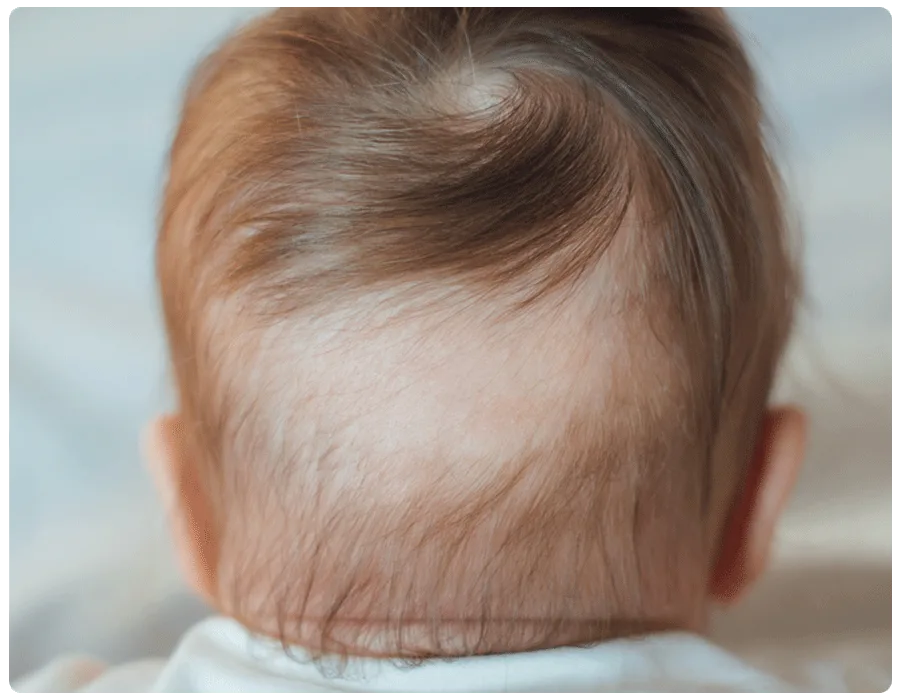How Baby’s Hair May Change After Birth—and Why
When it comes to newborn hair, there’s a wide range of what’s considered normal. Many babies are born without any hair, some arrive with a few sporadic strands and others come onto the scene with a plethora of enviable locks. As baby grows throughout the first few years of life, you’ll see their hair evolve. But what causes these baby hair changes—and will the color and texture remain the same or look and feel completely different? Keep reading to learn everything you need to know about baby hair growth and infant hair loss, plus expert tips on baby hair care to keep that mini mane healthy and beautiful.
While scientists aren’t entirely sure why some newborns are born with baby hair and others aren’t, it likely has to do with a combination of baby’s hormones, genetics, DNA and ethnicity, explains Denise Scott, MD, an Oklahoma-based pediatrician. If baby was born sans hair, it’ll likely start to grow soon. In fact, hair follicles begin to develop in the womb at 14 weeks gestation, and newborns are born with all the hair follicles they’ll have and need throughout their lifetime, says Scott.
But while baby hair follicles may be present at birth, the type of hair baby is born with will change. Newborns are born with vellus hair, which consists of short and thin strands (aka peach fuzz), says Latanya Benjamin, MD, FAAD, FAAP, a pediatric dermatologist and consultant for the skincare brand Mustela. They’ll also likely experience newborn hair loss shortly after birth, and the subsequent hair that’ll grow back may be a little different. Infant hair loss is normal, and it’s not a cause for concern, but it does mean that baby typically won’t have a full head of hair until they’re between 6 months and 2 years old. It’s not a definitive timeline, so talk to your doctor if you have any concerns. That said, if infant hair thinning lasts beyond the two-year mark, there may be an underlying cause, notes Alexis Phillips-Walker, DO, a pediatrician at Memorial Hermann Medical Group Pediatrics in Atascocita, Texas.
[Baby had a] full head of black hair, lost the sides and had a mohawk/rat-tail combo, then [it] grew back brown!
Most newborn hair loss occurs during the first six months of life. (In fact, though you can’t see it, Benjamin says that baby hair loss actually begins in the womb during the final trimester of pregnancy.) Newborn hair loss may be noticeable around 2 months and usually peaks when baby is 3 to 4 months—which is also around the time Mom may begin to experience postpartum hair loss.
Newborn hair loss is perfectly normal—it’s part of the telogen wave, which is the natural hair cycle of synchronized shedding and growth. “When a new hair growth cycle begins, the old hair falls out,” says Scott. Hormones also play a role in newborn hair loss. Hormone levels are high in the womb, but drop significantly at birth; this dramatic shift leads to hair loss and slows newborn hair growth, explains Scott. (And, for the record, this is also what happens with postpartum hair loss.)
Common skin issues like cradle cap can also play a part, says Phillips-Walker, as can friction from baby sleeping on their back (which is the safest way for infants to sleep). Regardless of why it’s happening, newborn hair loss isn’t usually a cause for concern. However, if you see patchy, bald spots with red, flaky scales; smooth bald patches or other skin rashes on baby’s scalp, let your pediatrician know.
My first lost all her baby hair and didn't start growing more until she was almost a year old. She wasn't born with a lot though. My second was born with a full head of hair and has lost some in the front. I’m really hoping and praying she doesn't lose anymore—I love all her hair! I think it's different with each baby.
The hair regrowth cycle for follicles can take up to 12 weeks for healthy babies, Benjamin says, but there’s a range of what’s normal. You may not notice a difference overall in baby’s hair growth until they’re between 6 and 18 months—though for some children it could take up to two years, says Scott. But if baby starts to lose their hair again after it has grown back in or after the age of 6 months, let your pediatrician know. “There can be a number of causes for this, many of which are treatable,” says Scott. Sometimes nutritional deficiencies can play a role in infant baldness. What’s more, scalp care techniques or baby shampoos that are overly aggressive may also play a part in infant hair thinning, Benjamin adds.
Looking for examples of what baby’s hair growth might look like? Ultimately, a lot of this will depend on genetics, but check out the below images to get an idea of what baby hair can look like. (Spoiler: It’s a range!)
The short answer is yes. Once baby’s hair starts to regrow, their initial vellus hair will darken as it transitions to terminal hair (the permanent hair seen in older children and adults). But, even beyond this, baby’s hair color may continue to fluctuate throughout the first five years of life. Baby’s permanent hair color is predetermined by chromosomes when they’re conceived, but the shade can change for several years before the permanent color emerges, says Scott. A study found that many babies (both male and female) had darker hair for the first six months of life, and lighter hair between 9 months and 30 months of age. Then, after the age of 3, the subjects’ hair became progressively darker until they turned 5. (It’s important to note this research only looked at white, European children.)
Along with baby hair color, texture may also fluctuate throughout a child’s early years. “Straight hair may come in curly, or thick hair may come in thin (and vice versa),” notes Phillips-Walker. “Genetics and baby’s own hormones help determine which it’ll be.”
My daughter had a lot of very dark hair at birth and by one she had curly golden blonde hair!
With all the changes that happen to baby hair during those early years, it’s only natural to wonder how you can keep those little locks healthy and fresh. Luckily, there are a number of things you can do to promote baby’s hair growth.
- Be gentle: Use “gentle strokes with a soft baby brush and soft bristles,” advises Benjamin. Or, consider using a wide-toothed comb on wet baby hair to avoid snagging or pulling.
- Don’t over wash baby hair: Babies actually don’t need to be cleaned much during those first few months—and excessive washing may strip the natural, beneficial oils on their scalp and skin, leading to dryness and infant baldness. Newborns only need their hair washed once or twice a week, adds Scott. When you shampoo baby’s hair, use a soft washcloth, rather than your hands.
- Be mindful of products: Scott recommends avoiding the use of conditioner unless baby’s hair or scalp is dry. Moreover, look for products with natural ingredients (like sunflower oil) to naturally help protect and nourish baby’s scalp, advises Benjamin. Finally, opt for a gentle tear-free shampoo that doesn’t put stress on baby hair follicles.
- Avoid accessories and tight hairstyles: As cute as those baby hair accessories can be, it’s best not to use them daily, especially if your child is already experiencing infant hair loss or having trouble with hair regrowth. Using accessories on baby’s hair occasionally is okay, but opt for headbands, hair bands and clips that are soft and won’t pull on baby’s hair when removed. Avoid tight ponytails or braids, as they may cause baby hair breakage.
- Practice tummy time: Scott recommends practicing tummy time with newborns and keeping them safely off their back when they’re awake, as this may help counter some newborn hair loss. Aim for at least 30 minutes of tummy time a day.
- Massage baby’s scalp: Before baby’s hair even comes in, parents can promote better hair growth by brushing and massaging the scalp, as this helps increase blood flow and stimulates hair follicles. But “don’t try to use different products and oils to do this, because you can cause allergies in sensitive baby skin,” cautions Phillips-Walker.
- Proactively treat cradle cap: Cradle cap may play a role in infant hair loss, so it’s best to treat it early, says Scott. If baby does get cradle cap, she recommends massaging mineral or olive oil into their scalp for about 10 minutes, and then very gently scrubbing the scalp while shampooing with a soft toothbrush or a hair brush designed for or cradle cap to help remove scales.
Don’t tell anyone but my blonde hair is—gasp—an expensive illusion. My hair is actually midnight black. But all three of my kids have the most gorgeous dirty-blonde locks. Genetics are funny like that. I guess I can thank my husband for those recessive (but insistent!) genes!
Once your little one has a full head of hair that’s growing longer with each passing day, you’ll likely start thinking about going for baby’s first haircut. There’s no right or wrong time to make that milestone appointment. “Trust your gut, but definitely [get it done] before hair reaches the length that it’ll get in [baby’s] eyes,” advises Scott. That said, there may be some benefits to waiting until baby’s at least one-year-old. Not only does it allow more time for baby’s hair to grow, it also means that your child will be able to sit up and support their own head during the process, which is ideal for safety. Additionally, Scott debunks the myth that cutting baby’s hair earlier guarantees better growth or thickness, so there’s really no rush.
Wondering if you can cut your kiddo’s baby hair yourself? While you can certainly try, it may prove to be a stressful and slightly dangerous experience, as babies move quickly. If you’re intent on cutting their hair yourself, follow these tips on how to cut a baby’s hair from Scott:
- Use scissors with short blades; they’ll be easier to control (avoid razors and shavers, unless you’re a licensed professional).
- Position baby in a high chair, and make sure they’re fed and well rested (you want them to be in a good mood!).
- Enlist the help of a second adult to help control baby’s head and hand movements, and distract them, as needed.
That said, for safety reasons, Benjamin suggests getting baby’s first haircut done by a professional. “They may play a greater role in holding or positively distracting the child,” she says.
Frequently Asked Questions
Which parent determines hair color and texture?
According to Scott, hair color and texture are determined by genes from both parents. As is true with eye color, darker colors usually tend to be more dominant. “The amount and type of melanin, or pigment, in hair controls the color,” she explains. “This is determined by many genes, but the one most known is the melanocortin 1 receptor gene, or MC1R. Usually, an individual receives one of these MC1R genes from each parent.”
What is hairy baby syndrome?
Hairy baby syndrome, also known as hypertrichosis or “werewolf syndrome,” is a condition in which hair can excessively grow in patches or all over the body. It may be present at birth or appear later on, Scott explains. Hypertrichosis usually occurs due to a genetic abnormality and is incredibly rare.
Is it normal for babies to have bald spots?
Even if baby is born with hair, they may lose it over the first several months of life, developing bald spots or even becoming bald. Plus, “since newborns are mostly positioned on their back, a bald spot will commonly develop on the back of the head which may last longer than other bald spots,” Scott notes.
Is it okay if my newborn is totally bald?
As noted, it’s completely normal for newborns to be born bald—and many are. Even babies who are born with hair may lose it and become bald for a time as their hair grows back in, Scott reiterates.
Is it normal for newborns to have hair all over their body?
A newborn may have very fine hair, known as lanugo, all over their body at birth. “It has a role in protecting baby’s skin and helping to regulate body temperature in the womb,” Scott explains, adding that lanugo does usually start to fall out in the womb as baby approaches full-term. If baby is born with lanugo, you can expect it to fall out over the first few weeks following birth. “Premature babies are more likely to have lanugo, or more of it, than term babies,” Scott notes, adding that, “Genetics and ethnicity also play a role in this, since darker-skinned babies may have more lanugo than lighter-skinned infants.”
What age does hair growth peak?
On average, hair growth in humans peaks between 15 and 30 years old, Scott notes.
Are there any benefits to shaving a newborn baby’s head?
In some cultures, such as Hinduism, it’s believed that shaving baby’s head after birth will help cleanse the body and prepare it for life, as well as help promote healthy hair growth. However, Scott notes that, scientifically, it’s been found that shaving a baby’s head doesn’t change anything in terms of growth: “It’ll neither cause it to grow in faster or thicker…. Hair thickness and rate of growth is determined by genetics. When a baby is born, they’re born with all the hair follicles they’ll have for life. Nothing a parent does will cause hair to come in faster.”
The bottom line? Baby hair will change a lot throughout the early months and years of childhood. Take comfort knowing that newborn hair loss and baby hair regrowth isn’t typically a cause for concern. “There aren’t ways to increase hair growth or thickness since this is determined genetically and will occur over time. The best way to support a healthy head of hair is with good nutrition,” Scott says.
However, if you have questions about baby’s hair and any bouts of infant baldness, don’t hesitate to flag them with your pediatrician—even if they don’t bring up the topic. “Baby scalp care is often overlooked, and not frequently discussed in the doctor’s office,” says Benjamin. Listen to your instincts and know that baby’s luscious locks will likely grow in soon.
Please note: The Bump and the materials and information it contains are not intended to, and do not constitute, medical or other health advice or diagnosis and should not be used as such. You should always consult with a qualified physician or health professional about your specific circumstances.
Plus, more from The Bump:
Denise Scott, MD, is a pediatrician and pediatric endocrinologist based in Oklahoma with over 20 years of experience. She received her medical degree from the University of Texas Medical Branch and completed her residency at the University of Oklahoma Health Sciences Center, with a fellowship at the National Institutes of Health.
Latanya Benjamin, MD, FAAD, FAAP, is a pediatric dermatologist and dermatologic surgeon, as well as a consultant for the skincare brand Mustela. She earned her medical degree from Drexel University College of Medicine and Hahnemann University, and completed her pediatric residency at University of Miami Miller School of Medicine and her fellowship in pediatric dermatology at Northwestern University Feinberg School of Medicine.
Alexis Phillips-Walker, DO, is a pediatrician with Memorial Hermann Medical Group Pediatrics Atascocita in Atascocita, Texas. She earned her medical degree at Ohio University College of Osteopathic Medicine in Athens.
US Department of Justice, Change in Hair Pigmentation in Children From Birth to 5 Years in a Central European Population (Longitudinal Study), July 2000
Learn how we ensure the accuracy of our content through our editorial and medical review process.
Navigate forward to interact with the calendar and select a date. Press the question mark key to get the keyboard shortcuts for changing dates.

























































